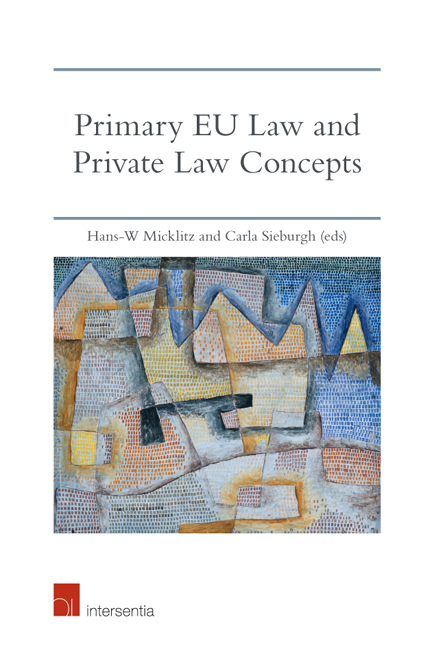Book contents
- Frontmatter
- Preface
- Summaries of the Chapters
- Contents
- Table of Cases: Alphabetical
- Table of Cases: Chronological
- List of Authors
- Chapter 1 Primary EU Law and Private Law Concepts
- Chapter 2 The Impact of Free Movement of Goods and Services on Private Law Rights and Remedies
- Chapter 3 The Impact of Free Movement of Capital on Private Law
- Chapter 4 The Impact of Competition Law on the Private Law Concepts of Nullity and Damages
- Chapter 5 The Impact of Article 101(2) TFEU Nullity on Private Law
- Chapter 6 The Impact of EU State Aid Law on National Private Law
- Chapter 7 The Impact of EU Intellectual Property Law and the Charter on Private Law Concepts
- Index
Chapter 6 - The Impact of EU State Aid Law on National Private Law
Published online by Cambridge University Press: 27 September 2018
- Frontmatter
- Preface
- Summaries of the Chapters
- Contents
- Table of Cases: Alphabetical
- Table of Cases: Chronological
- List of Authors
- Chapter 1 Primary EU Law and Private Law Concepts
- Chapter 2 The Impact of Free Movement of Goods and Services on Private Law Rights and Remedies
- Chapter 3 The Impact of Free Movement of Capital on Private Law
- Chapter 4 The Impact of Competition Law on the Private Law Concepts of Nullity and Damages
- Chapter 5 The Impact of Article 101(2) TFEU Nullity on Private Law
- Chapter 6 The Impact of EU State Aid Law on National Private Law
- Chapter 7 The Impact of EU Intellectual Property Law and the Charter on Private Law Concepts
- Index
Summary
INTRODUCTION
Articles 107 and 108 of the Treaty on the Functioning of the European Union (TFEU) govern the relationship between the European Commission (‘the Commission’) and EU Member States regarding the award of subsidies and other measures having an equivalent effect. Strictly speaking, EU state aid law is not concerned with relationships between individuals. The recipient of aid, which is oft en a private firm, is not the subject of the obligations stemming from Articles 107 and 108 TFEU. In proceedings before the Commission, the recipient is an ‘interested party’ alongside its rivals and other third parties.
Pursuant to Article 108(3) TFEU, it is for the Member State to inform the Commission about its plans to implement any measure falling under the scope of Article 107(1) TFEU. By the same token, it is for the Member State to take the necessary measures to recover the aid that has been granted unlawfully, that is, in breach of the notification (or ‘stand-still’) obligation.
In spite of the above, there are several reasons why EU state aid law has an impact on contractual and non-contractual relationships. The first and most obvious one is economic in nature. One of the objectives of Articles 107 and 108 TFEU is to prevent the distortions of competition that typically result from the award of subsidies and similar measures. At least to some extent, EU state aid law is a complement to Articles 101 and 102 TFEU, which deal with rivalry between firms. The competitors of aid recipients are likely to become involved in proceedings before the Commission, sometimes as complainants, 5 or to seek relief before national courts. For instance, it is possible for competitors to claim damages for a breach of the principles set out in Articles 107 and 108 TFEU. From this perspective, EU state aid law can be seen as a potential source of noncontractual obligations.
The second reason, of particular relevance for the purposes of this chapter, is that state aid may be awarded by means of a contract or a similar mechanism. An agreement between a public body and a firm may be caught by Article 107(1) TFEU and as such be subject to the principle of incompatibility set out in that provision.
- Type
- Chapter
- Information
- Primary EU Law and Private Law Concepts , pp. 207 - 240Publisher: IntersentiaPrint publication year: 2017

